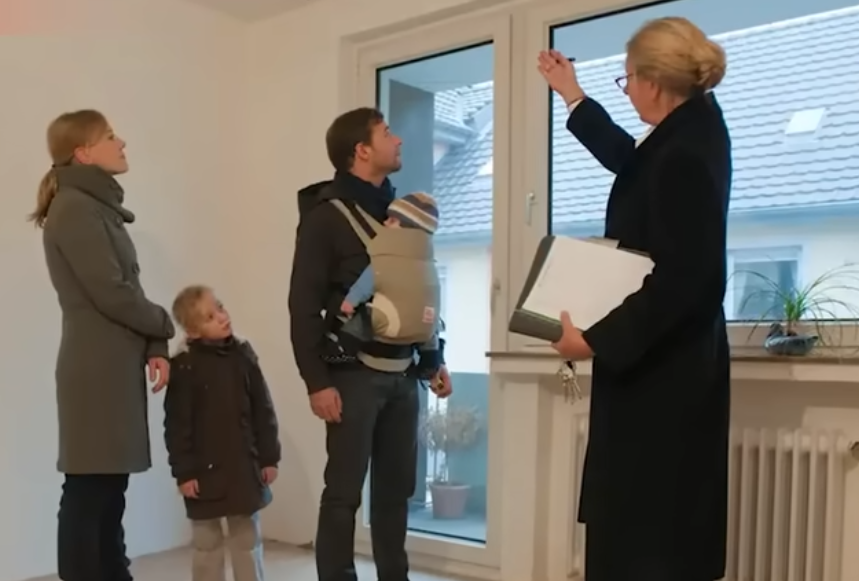In Vietnam, the psychology of settling down is not just a proposal but a way of life, something deeply rooted in the flesh of generations. Buying a house is not only for accommodation but also to assert one's position in society. To feel safe, stable, and to leave a legacy by passing on property to descendants. A home for the Vietnamese people is not just four walls, but a symbol of success, maturity, and bamboo Buffalo to build a house. But in Germany, everything is different; there is a thought that is completely unlike Vietnam.
Germans do not view home ownership, do not consider buying houses, and homes are not the biggest goals in their lives. According to statistics, more than half of Germans living in apartments rent, and in large cities like Berlin, Hamburg, or Munich, this figure can be as high as 70-80%. Renting a house in Germany is not just a choice but a popular lifestyle, almost a default.
What makes Germans love renting such homes?

Let's delve into each reason. The first reason is the historical context. Germany is a country that fought during World War II, and they suffered defeat. When World War II ended, Germany was almost a huge wreck. Allied bombing campaigns flattened most major cities. Berlin was destroyed with about 80% of its central buildings. In many areas, there are only foundations and bricks left. For example, in some other cities, Dresden has almost disappeared from the map. Then places like Hamburg, Frankfurt, or Munich also experienced the same scene. It is estimated that across the country, more than 2.25 million apartments were completely destroyed, and it is added that about 2 million units were seriously damaged.
In other words, almost half of Germany's housing stock before the war disappeared after just a few years of bombing. After the war, Germany's population was between 40 and 45 million, and the war was very tough, and after the war, jobs were not plentiful. They were forced to pour into big cities to find work and housing. But the infrastructure had almost disappeared. There are three or four families that have to live in a small apartment with two or three rooms. Expanded areas were temporarily made of bricks, wooden, home houses.
And the government had to face the enormous task of reconstructing the economy and solving housing for millions of people. In this context, the West German government chose a strategy of building rental houses at low prices. The Federal Housing Act was born in the late 1940s, aimed at prioritizing the development of social housing. This was the fastest and cheapest way to meet people's needs. Because building multi-story apartments can accommodate more people and reduce costs per head.
Renting also helps with real estate speculation and allows the state to control prices very well. Thus, millions of Germans had homes, millions of post-war people grew up in such social housing or apartments. This formed a sustainable habit. Homes are no longer a temporary value but become the standard. Parents who rent their whole lives see their children grow up to rent. No one feels the pressure to buy a house, as in many other countries.

History is the beginning, and when it comes to buying or renting, it is still at a price that is always very realistic. This is one of the biggest reasons why Germans prefer to rent a house. This is because the rental market in Germany is very stable and protected by an extremely tight legal system. It is simple; renting a house in Germany is not the same as in Vietnam, where you can suddenly find yourself a homeowner or be invited to leave the house at any time.
In Germany, everything is clearly defined, helping tenants feel secure as if they live in their own home. First of all, Germany has a rent control law. This law applies in many major cities such as Berlin, Hamburg, Munich, or Cologne. It ensures that rental prices do not increase too much compared to the average price in the area. For example, if an apartment in Berlin has an average rent of 800 euros per month, the landlord cannot arbitrarily increase it to 1200 euros just because the market is hot. If they try to do this, you can sue them in court and demand the rental price.
This law allows tenants to create long-term financial plans and not worry about shocks because rental prices are rising. You rent your home to know that the price will be stable and do not fear increases. Another thing is that renting German homes is usually an unlimited contract. This means you can stay in this apartment as long as you like, as long as you pay the rent on time and do not violate the contract. There are Germans who have rented an apartment from a young age to old age, living there for several decades and still being fine. Does the landlord want to terminate the contract? It is not easy. They must have valid reasons, such as needing to use the apartment for their families or you seriously violating the contract, such as not paying for several months.
Even in these cases, the landlord must notify you at least a few months in advance, depending on how long you have rented. In some cases, they must also compensate you to give you the opportunity to find a new place. Compared to Vietnam, where the rental market is quite free, in Germany, renting a house to provide a sense of security is almost equivalent to owning a home; it is almost like your home. In Vietnam, if a landlord wants to reclaim their house just after 1 month or increases the rent, it always puts tenants in a state of insecurity and irritation.
But in Germany, you can be sure behind the scenes, without worrying about being disturbed. This is one of the main reasons why Germans do not feel the pressure to buy a house; simply renting it is good. And this has formed the German way of life. Germans, especially the younger generation, place great importance on easy movement rather than being tied down in one place. It is a country with a developed economy with many job opportunities in different cities. Renting houses allows for easy switching of places when necessary, without being tied to long-term mortgages or the difficulties of selling homes.
Imagine you are an engineer or work in any profession in Berlin. One day you receive an invitation to work in Munich with a higher salary. You really want to come here for work. If you have a house in Berlin, you will have a headache thinking about how to sell the house, find a buyer, or even suffer losses if the real estate market declines. But if you rent a house, everything is much simpler; you just need to notify the landlord a few months in advance, pay the rent, pack your suitcase, and go.

In Munich, you continue to rent a new apartment. That's it, no problems. In Vietnam, this is probably a bit complicated. In Vietnam, the stable mindset still dominates. When buying a house, Vietnamese people often think they will be there for life or at least for a long time. Moving to another city is often considered inconvenient and unnecessary. Not to mention that in Vietnam, job mobility between major cities like Hanoi, Ho Chi Minh City, or Da Nang is probably not as popular as in Germany, where all cities have attractive and connected opportunities more conveniently than in Vietnam. Thus, the German language decided to rent a house to maintain freedom and flexibility in their modern lives.
And another fact is that buying a house in Germany is very expensive.

Everywhere is very expensive, and a German house is no cheaper than when we compare average income, as we compare with Vietnamese houses. And still, when buying a house in Germany, you also have to pay a series of other expenses. The first is the property transfer tax, which ranges from 3.5% to 6.5% of the apartment's value, depending on the bank. Then there is the notary fee of 1% to 2% of the house's value. The brokerage fee can be up to 7% if you buy through real estate companies. The inclination to buy a house for 800,000 euros may require from 80,000 to 100,000 euros for these expenses.
Not to mention that after purchasing, there are costs for repairs and maintenance of the houses. Because many houses in Germany, especially old houses, need to be repaired before living in them. If you do not have enough money to buy a house immediately, you will have to take out a mortgage. Thus, if income is unstable or the real estate market is also unstable, you may fall into debt. Compared to renting a house, where you simply pay a fixed amount of money each month without worrying about incurred costs, buying a house has too many weaknesses. Another interesting thing in Germany is that society does not judge you based on whether you own a house or not. In Vietnam, if they are older and still rent a house, it is a bit inconvenient. And now, men without a house find it harder to speak the truth in the city to get married.
But in the completely normal story of renting, including people with high incomes such as doctors, lawyers, or engineers. In Germany, people are interested in quality of life, personal freedom. How to live, how to live for happiness, how to live for entertainment, how to live for comfort. More than if you hold a red book, naming a house or not. If you look deeper, you will find that renting a house in Germany is not only a practical choice but also part of the culture and lifestyle. Germans promote their pragmatism and personal freedom. For them, life is not a race to own as much property as possible, but to live comfortably, enjoy what they have, and not be tied down by unnecessary things.

Renting helps them achieve this. They have stable housing but still maintain the flexibility to change, explore, and live as they wish. In contrast, in Vietnam, the culture of Lac Nghiep reflects a traditional society where family and long-term stability take precedence. A home is not just a place, but a home is a place for connecting generations. However, this also creates great pressure, especially for the younger generation now, when property prices are high, and buying houses becomes a financial burden not only for you but also for your parents.
